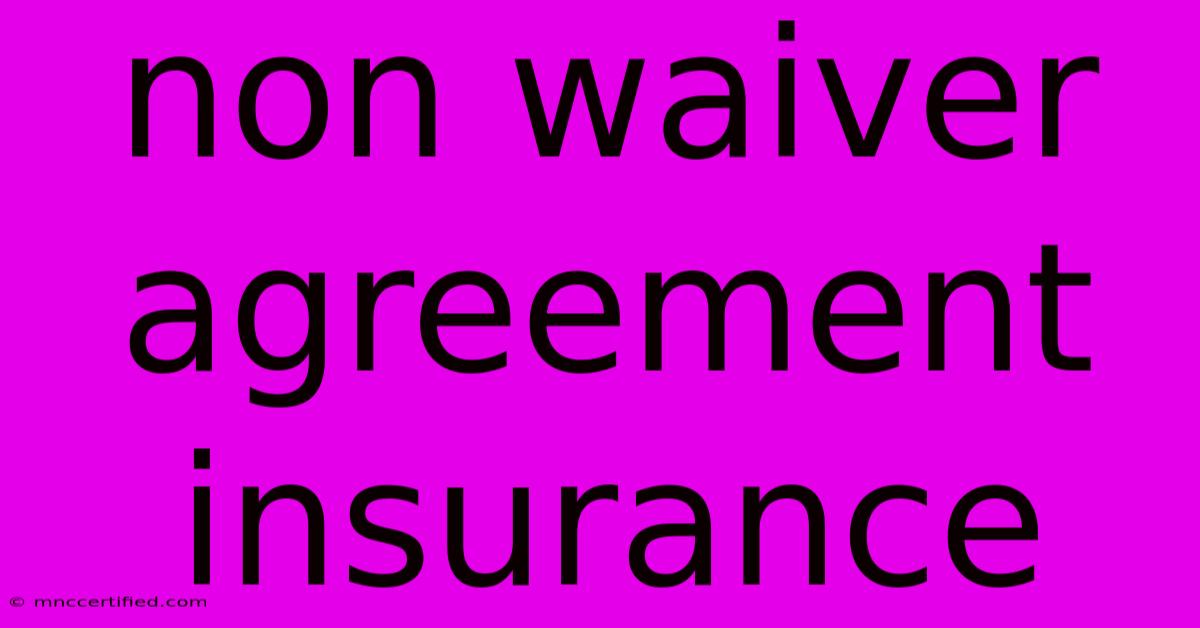Non Waiver Agreement Insurance

Table of Contents
Non-Waiver Agreements in Insurance: Protecting Your Rights and the Insurer's
Navigating insurance claims can be complex, especially when disagreements arise about coverage. A non-waiver agreement is a crucial tool used in these situations to protect both the insured and the insurer. This article will delve into the intricacies of non-waiver agreements, explaining their purpose, key elements, and how they impact insurance claims.
What is a Non-Waiver Agreement?
A non-waiver agreement is a written document signed by both the insured and the insurance company. Its primary purpose is to allow the insurer to investigate a claim thoroughly without implicitly waiving its right to deny coverage later. Essentially, it's a way to preserve the insurer's legal rights while simultaneously cooperating with the insured during the investigation process. Think of it as a temporary truce that doesn't compromise either party's ultimate position.
Key takeaway: A non-waiver agreement does not guarantee payment; it merely allows for a full investigation without prejudicing either party's rights.
Why are Non-Waiver Agreements Necessary?
Several scenarios necessitate a non-waiver agreement:
-
Investigating a Potentially Fraudulent Claim: If the insurer suspects fraud, a non-waiver agreement allows them to conduct a thorough investigation without accidentally conceding coverage by engaging in seemingly cooperative actions.
-
Disputes Over Policy Coverage: Ambiguity in the policy language or disagreements about whether the incident falls under the policy's coverage can necessitate a non-waiver agreement. This protects the insurer from accidentally admitting liability.
-
Delayed Reporting of a Claim: If a claim is reported late, a non-waiver agreement ensures the insurer can investigate the delay without forfeiting its right to deny the claim based on the late reporting.
-
Complex Claims: Claims involving substantial damages or multiple parties often benefit from a non-waiver agreement to maintain a clear record of the investigation and subsequent decision-making process.
Key Elements of a Non-Waiver Agreement
A well-drafted non-waiver agreement should clearly state the following:
-
Acknowledgement of the Claim: The agreement explicitly acknowledges the existence of the insurance claim.
-
Reservation of Rights: The insurer explicitly reserves the right to deny coverage, regardless of any actions taken during the investigation.
-
Cooperation Clause: The insured agrees to cooperate fully with the insurer's investigation.
-
No Admission of Liability: The agreement explicitly states that neither party admits liability by entering into the agreement.
-
Signatures of Both Parties: Both the insured and an authorized representative of the insurance company must sign the agreement.
Understanding Your Rights with a Non-Waiver Agreement
Receiving a non-waiver agreement can be concerning, but it doesn't automatically mean your claim will be denied. It simply signifies that the insurer needs more information before making a determination. Remember:
-
Seek Legal Counsel: If you receive a non-waiver agreement, it's strongly recommended to consult with an attorney specializing in insurance law. They can help you understand your rights and navigate the complexities of the claim process.
-
Cooperate with the Investigation: While you have the right to legal representation, cooperating with the insurer's investigation often helps expedite the process.
-
Maintain Detailed Records: Keep meticulous records of all communications, documents, and evidence related to your claim and the non-waiver agreement.
Non-Waiver Agreements and the Importance of Clear Communication
The presence of a non-waiver agreement highlights the importance of clear communication between the insured and the insurer. Open dialogue, transparency, and a thorough understanding of the policy terms can prevent many disputes and minimize the need for such agreements. However, if a dispute arises, a non-waiver agreement serves as a critical safeguard, protecting the rights of all parties involved.
Off-Page SEO Considerations:
To improve the search engine rankings of this article, consider the following off-page strategies:
- Link Building: Reach out to relevant websites (insurance blogs, legal websites) and request links to this article.
- Social Media Promotion: Share the article on social media platforms to increase visibility and drive traffic.
- Guest Blogging: Write guest posts for other websites in the insurance or legal niche, including a link back to this article.
By understanding the intricacies of non-waiver agreements, both insurers and policyholders can navigate the complexities of insurance claims more effectively and protect their respective interests. Remember to always seek professional legal advice when facing complex insurance claim situations.

Thank you for visiting our website wich cover about Non Waiver Agreement Insurance. We hope the information provided has been useful to you. Feel free to contact us if you have any questions or need further assistance. See you next time and dont miss to bookmark.
Featured Posts
-
Car Insurance Jokes One Liners
Nov 27, 2024
-
Insurance For Hotshot Trucking
Nov 27, 2024
-
Reverend Coles I M A Celeb Exit
Nov 27, 2024
-
Barcelona Brest Confirmed Starting Xis
Nov 27, 2024
-
Baby Saber Toothed Tiger Mummy
Nov 27, 2024